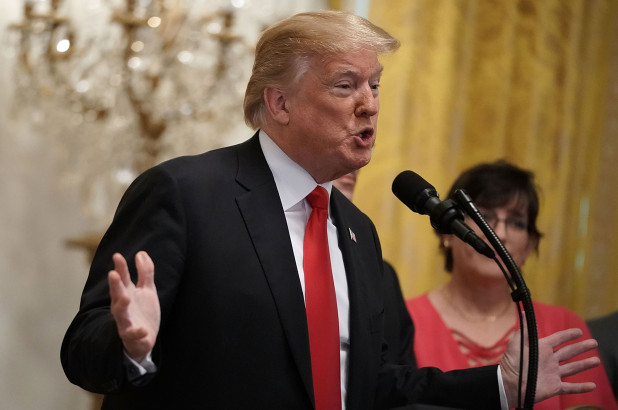Tensions between Washington and Tehran escalated rapidly after a U.S. drone was shot down by Iranian forces in the Middle East on Thursday — but experts are not expecting it to lead to an outright military conflict.
“Neither the Iranians nor the Americans can really gain anything. This is a complete lose-lose situation,” said Trita Parsi, adjunct associate professor at the Center for Security Studies at Georgetown University.
An Iranian surface-to-air missile downed an unmanned U.S. military surveillance drone on Thursday. Washington said the attack took place over the Strait of Hormuz — an international waterway. But Tehran said the aircraft had entered its airspace.
“This is a tremendously tense situation,” Parsi said, adding that “the real trick here is to find a way to de-escalate.”
Relations between the two countries deteriorated significantly after the Trump administration’s decision last year to unilaterally withdraw from the 2015 Iran nuclear agreement. Since then, Washington has restored sanctions on Iran’s vital oil sector, aimed at crippling the Islamic Republic’s economy.
Just last week, Washington blamed Tehran for attacks on two oil tankers in the Persian Gulf — allegations that Iran denied.
Parsi blamed U.S. President Donald Trump for the latest escalation.
“This entire crisis is unnecessary, this was a resolved issue, Trump unfortunately unresolved it and I frankly don’t think he thought it would bring him to this point, ” said Parsi.
The New York Times reported late Thursday that in response to the U.S. drone attack, Trump approved military strikes against Iranian targets, but later withdrew from launching the planned attacks.
“We are literally, on the verge of further escalation,” Parsi warned after the Times report.
“And there are those in the White House who believe that if the U.S. strikes with some Tomahawk missiles, the Iranians will not retaliate. Mindful of everything we’ve seen so far, that seems to me as a very foolish premise,” he said. “The Iranians have made it quite clear that they will retaliate if attacked.”
The U.S. is unlikely to retaliate using military power in response to the the downing of the unarmed Global Hawk aircraft, Eurasia Group said in a note on Thursday.
Still, the political risk consultancy raised “the probability of war between the US and Iran to 40%.” Analysts had predicted a 30% probability of war in a May report.
“I don’t think either side wants an outbreak at this point right now, ” Jeff Currie, global head of commodities research at Goldman Sachs told CNBC’s Street Signs on Friday.
He pointed out that Trump’s most recent comments have softened but “geopolitical tensions are escalating.”
Source: CNBC & Reuters
